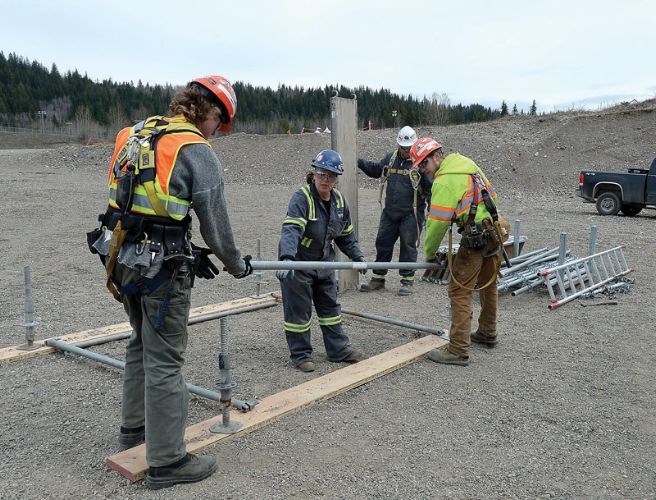Millions of dollars in high-tech metal fell into the hands of unqualified teenagers last Friday. Heavy Metal Rocks was back in the region that invented it - with 32 young people behind the wheel of almost every major machine known to the construction industry.
Heavy Metal Rocks is a School District 57 and College of New Caledonia trades training initiative, in partnership with WorkSafeBC and the Prince George Construction Association.
Now in its 10th year, donated heavy equipment and supervising professionals rumble over the terrain at the Inland Concrete gravel pit on North Nechako Road, while aspiring youth try their hand controlling these rare machines.
"Heavy Metal Rocks rocks," said one of those teens with trades in his eyes. Austin Angell, 17, goes to Kelly Road Secondary School and has been dreaming of these ultra-power tools since he was a small boy.
"I've driven some of these before. I've been around it most of my life," Angell said. He has done some volunteer work for Westbin Waste in Prince George and Allen's Scrap and Salvage in Terrace. Road construction is his preferred career path.
"We used to live beside the scrap yard. Dad worked there. It was great for me, I got really interested in all this," he said. "I'd like the opportunity to operate heavy equipment until I retire."
"Given the job opportunities we are anticipating, we need one in five B.C. high school students to go into the trades. We currently have one in 32," said Abigail Fulton, vice-president of the BC Construction Association. "I have experience recruiting skilled labour offshore, so I know what the challenges are in the industrial sector. We need our northern youth to shift their thinking to the trades, and we especially need parents to shift their thinking, so we can have northerners at the front of the line for those jobs, and filling as many of those employment needs as possible."
There are in excess of 30 certified trades active on the northern B.C. landscape, said construction association president Roz Thorn.
More than just revving the engines and spinning the wheels of more than a dozen kinds of machines, Thorn said Heavy Metal Rocks is a four-day course that has its own recognition within industry.
"These students could not come out here today to drive the machines unless they had passed their Construction Safety Training Certificate, and that looks good on their resume," she said. "On a lot of job-sites in B.C., you can't work there unless you have that certification. They all now have it."
It is even true that some youth have gotten jobs with construction companies because they were scouted at Heavy Metal Rocks. Each of the 16 work stations is overseen by at least one industry professional, and they have spotted talent on occasion. In many instances, participants in the program go on to further studies and then into the construction workforce.
Cory Klein of RF Klein and Sons has been one of the organizing committee members for the past three years, and his family company has been involved since its inception. He estimates about a dozen of their employees over the years had Heavy Metal Rocks on their resume, four of them on the current roster, and one of them - Kyle Hugill - was across the gravel pit supervising Station 7 as the next crop got their hands-on experience.
"This is extremely important," said Klein. "It is getting harder and harder to attract youth to these professions, retain them, engage young people in thinking about construction careers. Most people don't have any access to machines like this, to get a feel for how it drives, how it responds to your touch, and enjoy the process of it. This is a way to expose youth to the rewards available to them through these industries - these machines. They have potential."
Anyone who thinks the old thoughts about trades kids being the ones with unsuccessful report cards never followed the development of these professions over the years. You don't put someone of lesser mind behind the wheel of a machine costing half a million dollars in a setting where people on the ground could be injured and millions of dollars in productivity could be threatened.
Klein, for example, started as a general labourer, got a CNC diploma in business management, then got a Bachelor of Technology degree at BCIT in construction management.
He was named to this year's Chamber of Commerce Top 40 Under 40 in Prince George.



